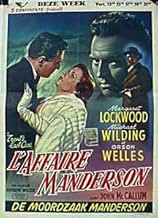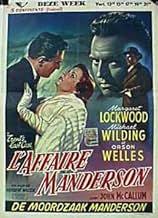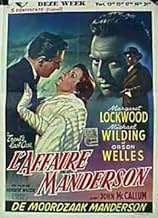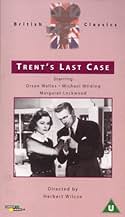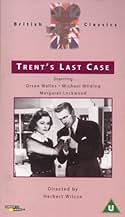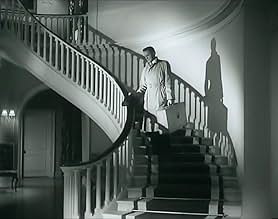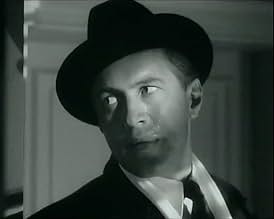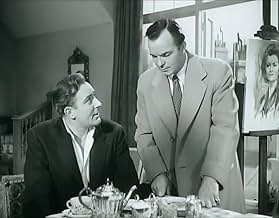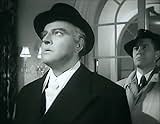A reporter investigates a rich businessman's death. While police rule it suicide, Trent believes it's murder and grows intrigued by the widow and secretary.A reporter investigates a rich businessman's death. While police rule it suicide, Trent believes it's murder and grows intrigued by the widow and secretary.A reporter investigates a rich businessman's death. While police rule it suicide, Trent believes it's murder and grows intrigued by the widow and secretary.
- Director
- Writers
- Stars
Geoffrey Bayldon
- Reporter in Court
- (uncredited)
Ernest Blyth
- Concert Attendee
- (uncredited)
Robert Cawdron
- Police Constable
- (uncredited)
John Chandos
- Tim O'Reilly
- (uncredited)
Anthony Collins
- Conductor
- (uncredited)
Henry Edwards
- Coroner
- (uncredited)
Eileen Joyce
- Pianist
- (uncredited)
Ben Williams
- Jimmy - Reporter
- (uncredited)
Kenneth Williams
- Horace Evans
- (uncredited)
- Director
- Writers
- All cast & crew
- Production, box office & more at IMDbPro
Featured reviews
I failed to notice that Orson Welles was in this film (recently screened by Talking Pictures TV), and when he appeared I wondered why the actor was impersonating Welles under a load of truly horrible makeup. However, Orson's talent shines through, especially in the car scene.
Kenneth Williams appears briefly - finding the body, and giving evidence at the inquest - in a Welsh accent! He was of Welsh descent, but was a true Cockney: there's a plaque on his parent's home in Marchmont Street. A small touch heralds his future brilliance: as the camera pans over the impassive witnesses, he gives one twitch of the cheek.
Margaret Lockwood is beautiful and enigmatic, and her servants (butler Martin and secretary Marlow) are characterful and convincing. Her wardrobe is fabulous. This was the era of the "New Look", which so often translated as the new frumpy. It consciously looked back to the eighteen-forties and fifties. As Lockwood sits in a box at a concert she looks straight out of the 1850s. The pianist, Eileen Joyce, plays Mozart in a train that covers most of the stage.
Philip Trent's art is not too bad - I wonder who did the prop drawings?
Kenneth Williams appears briefly - finding the body, and giving evidence at the inquest - in a Welsh accent! He was of Welsh descent, but was a true Cockney: there's a plaque on his parent's home in Marchmont Street. A small touch heralds his future brilliance: as the camera pans over the impassive witnesses, he gives one twitch of the cheek.
Margaret Lockwood is beautiful and enigmatic, and her servants (butler Martin and secretary Marlow) are characterful and convincing. Her wardrobe is fabulous. This was the era of the "New Look", which so often translated as the new frumpy. It consciously looked back to the eighteen-forties and fifties. As Lockwood sits in a box at a concert she looks straight out of the 1850s. The pianist, Eileen Joyce, plays Mozart in a train that covers most of the stage.
Philip Trent's art is not too bad - I wonder who did the prop drawings?
This viewer is not exactly a devotee of the films of Herbert Wilcox but this one is not at all bad. E. C. Bentley had intended his novel to be a parody and although Wilcox has chosen to play it straight one cannot actually take it too seriously. This director's notable lack of flamboyance happens to suit this rather innocuous, teddibly civilised period piece very well.
It is presented by Republic Pictures for whom Orson Welles had made his bizarre 'Macbeth.' One is intrigued by his third billing and eagerly awaits his appearance. It is certainly worth the wait as his Mephistophelian presence and basso profundo are absolutely magnetic. It seems as if we are suddenly in an entirely different film and one is hardly surprised to learn that Welles wrote and directed his own scenes!
As for the rest of the film we have the debonair Michael Wilding, certainly no stranger to Wilcox, who is well cast as Bentley's engaging amateur sleuth of the title. Playing the widow of the millionaire who is assumed to have committed suicide, although Trent suspects foul play, is Margaret Lockwood. It is far more difficult to play 'good' than 'bad' and Miss Lockwood is more effective when playing the latter. The same comment would also apply to John McCallum as the prime suspect. The delightful Miles Malleson is, well.....Miles Malleson!
There is splendid use made of the Larghetto from Mozart's C minor piano concerto which suits the melancholy mood of the film.
By far the best scene(surprise, surprise) is one directed and wonderfully lit by Welles in which he and John McCallum discuss Shakespeare's depiction of a husband's jealousy in 'Othello'. Welles remarks that he had recently seen this play performed at St. James's Theatre and was none too keen on the leading actor. He is of course referring to, yes, you've guessed it........ himself!
It is presented by Republic Pictures for whom Orson Welles had made his bizarre 'Macbeth.' One is intrigued by his third billing and eagerly awaits his appearance. It is certainly worth the wait as his Mephistophelian presence and basso profundo are absolutely magnetic. It seems as if we are suddenly in an entirely different film and one is hardly surprised to learn that Welles wrote and directed his own scenes!
As for the rest of the film we have the debonair Michael Wilding, certainly no stranger to Wilcox, who is well cast as Bentley's engaging amateur sleuth of the title. Playing the widow of the millionaire who is assumed to have committed suicide, although Trent suspects foul play, is Margaret Lockwood. It is far more difficult to play 'good' than 'bad' and Miss Lockwood is more effective when playing the latter. The same comment would also apply to John McCallum as the prime suspect. The delightful Miles Malleson is, well.....Miles Malleson!
There is splendid use made of the Larghetto from Mozart's C minor piano concerto which suits the melancholy mood of the film.
By far the best scene(surprise, surprise) is one directed and wonderfully lit by Welles in which he and John McCallum discuss Shakespeare's depiction of a husband's jealousy in 'Othello'. Welles remarks that he had recently seen this play performed at St. James's Theatre and was none too keen on the leading actor. He is of course referring to, yes, you've guessed it........ himself!
MICHAEL WILDING is an armchair detective who sets out to determine whether or not the death of ORSON WELLES was suicide or murder. He thinks he's solved the case, only to learn that all is not what it appears (without giving the outcome away).
Unfortunately, the script is a dreary, talky and ponderous, making the film appear to be an amateurish stage play, although based on a novel. It's static. Nothing at all cinematic about the approach, nor is there any imagination in the directing.
Of all the players, MARGARET LOCKWOOD as the beautiful wife of the deceased man and JOHN McCALLUM as the man's secretary have key roles that they play with assurance. ORSON WELLES, with fake nose and bushy brows, might as well have been from another film. His ten or fifteen minutes of time on screen renders nothing but ham. Director Herbert Wilcox was evidently unable to tone him down and as a result his key scenes throw the film off stride. MICHAEL WILDING has a colorless role as the newspaper reporter who suspects foul play but can't prove anything.
With a talky script and lack of any cinematic touches, TRENT'S LAST CASE goes nowhere fast and leaves the viewer expecting a strong twist that never arrives--instead, a flat ending.
Production values are fine even though the film comes from the usually low-budget Republic studios.
Unfortunately, the script is a dreary, talky and ponderous, making the film appear to be an amateurish stage play, although based on a novel. It's static. Nothing at all cinematic about the approach, nor is there any imagination in the directing.
Of all the players, MARGARET LOCKWOOD as the beautiful wife of the deceased man and JOHN McCALLUM as the man's secretary have key roles that they play with assurance. ORSON WELLES, with fake nose and bushy brows, might as well have been from another film. His ten or fifteen minutes of time on screen renders nothing but ham. Director Herbert Wilcox was evidently unable to tone him down and as a result his key scenes throw the film off stride. MICHAEL WILDING has a colorless role as the newspaper reporter who suspects foul play but can't prove anything.
With a talky script and lack of any cinematic touches, TRENT'S LAST CASE goes nowhere fast and leaves the viewer expecting a strong twist that never arrives--instead, a flat ending.
Production values are fine even though the film comes from the usually low-budget Republic studios.
I was pleasantly surprised by this film. I fail to understand why so many people have criticized it. I thought the entire peace of work was brilliant! Orson Welles gives a stirring and chilling performance as an insane cynical business man. I especially loved the fact that his presence remains quite strong through out the entirety of the film. The story reeks of the talent of Orson Welles. I am surprised that he did not direct the peace himself. We follow the story of a young new reporter looking for the story of a life time. He finds such a story within the home of a black widow, brilliantly played by Margret Lockwood. As i have stated many times, Margret Lockwood never ceases to amaze me with her subtle, but layered performances. She manages here to evoke a certain dismalness that cannot go unnoticed. She plays a rather mellow and unfeeling part. Frankly, her character is really not all that interesting. Margret plays her part well, but the part is very limited. The main focus is the character of Trent, a savvy and sly man who will stop it nothing to find the truth. This film is a classic murder mystery, produced in a citizen Kane manner. The flash back sequences are very well crafted, as well the plot and story structure. The other characters are also quite interesting. The character of Marlow is perhaps the victim of this tale and probably the most sympathetic of all characters. However,the ending is rather cliché and slightly destroys the tone of the film. I do recommend this film though on so many levels. If you want a good mystery story, as well as some good acting, then sit back and enjoy!
Agatha Christie considered this intrigue one of the best ever written, and it certainly is. The mystery is deep here, and as it gradually is unravelled you are in for any number of surprises. The actors are outstanding, with Michael Wilding as the detective intruding on the private lives of the young widow Margaret Lockwood and the man who loves her, who is the prime suspect, while Orson Welles as the victim provides an impressing finale as he enters in the final flashback. Miles Malleson plays an important part as a reluctant participant in the plot, while the story is what really matters. Herbert Wilcox' direction is faultless but very formal, giving the film a somewhat conventional character - there is no cinematography to speak of, while music plays an important part - Eileen Joyce has a moment as a performing pianist, and the film score is by Anthony Collins, who is also seen acting as a conductor - one of his rare appearances on film. After having reached the end of the story, and Michael Wilding closing his last case as Trent, yuo just have to agree with Agatha Christie about the marvellous windings of this plot.
Did you know
- TriviaIn the film, Sigsbee Manderson (played by Orson Welles) mentions a performance of Shakespeare's "Othello" at the St. James Theatre in London in 1951, in which he disliked the leading actor's performance. This is an in-joke: Welles himself played Othello at the St. James in 1951, under his own direction. Peter Finch played Iago opposite him.
- GoofsDuring the coroners inquest, Trent was seen drawing a sketch of Marlowe. This is not allowed in English Courts. Although court artists are allowed in as members of the public, all drawings must be done by memory outside the courtroom.
- Quotes
Margaret Manderson: He talks of reopening the case.
John Marlowe: You should've ordered him out of the house.
Margaret Manderson: And confirm his suspicions?
- SoundtracksPiano Concerto in C Minor
Music by Wolfgang Amadeus Mozart (as Mozart)
Arranged and Conducted by Anthony Collins (uncredited)
Performed by Eileen Joyce
Details
- Release date
- Country of origin
- Language
- Also known as
- Trentov poslednji slucaj
- Production company
- See more company credits at IMDbPro
- Runtime
- 1h 30m(90 min)
- Color
- Aspect ratio
- 1.37 : 1
Contribute to this page
Suggest an edit or add missing content

